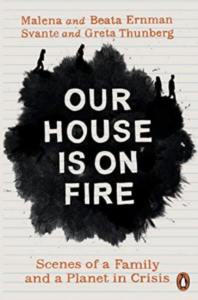 I was recently given the book Our House is on Fire, written by the family of Greta Thunberg – mainly by her mother, Malena Ernman. Its Swedish title means ‘Scenes from the Heart‘, and it is composed of short ‘scenes’, some about the family and some about Greta’s climate campaign. Greta, as we know, has autism and other problems. Her younger sister has ADHD and additional problems. The parents had their hands full.
I was recently given the book Our House is on Fire, written by the family of Greta Thunberg – mainly by her mother, Malena Ernman. Its Swedish title means ‘Scenes from the Heart‘, and it is composed of short ‘scenes’, some about the family and some about Greta’s climate campaign. Greta, as we know, has autism and other problems. Her younger sister has ADHD and additional problems. The parents had their hands full.
The climate crisis is the book’s other theme. Only when Greta began to do something about the climate crisis at the age of 15, with her school strike for the climate outside the Swedish parliament, did she begin to recover.
There is much variety in the more than 100 scenes. The book turned out to be a lot more interesting than I expected, with insights on the parents’ reactions to Greta’s concerns, on current welfare policies in Sweden, and increasingly as it went on a sense of urgency about the crisis that is climate change.
Greta has amazing clarity of vision. She dreamt up her school strike all by herself and was supported but definitely not encouraged in it by her parents. One example of her campaigning cunning and values: she did not want any corporate or political sponsorship. On the third day of her strike she was joined by a few other children. A man from a hamburger chain brought them some food. It was eaten but she told him she didn’t want him to do it again. In the afternoon he texted her to ask if she was sure she didn’t want him to bring any more food. She replied, “You’re welcome to offer us food, but it must be food that doesn’t come from a company that you work for.”
Reading the book made me aware that we need to do more to respond to the climate crisis as a crisis. We know now what a crisis looks like and what big changes are possible. Until we react just as extremely to increasing CO2 levels as we do to COVID-19, we cannot say we are treating climate change as a crisis. The book examines some of the reasons why we are still not doing this.
Quakers were influential backers of the Kindertransport before World War II. Is there anything we can unite around now that would make a concrete difference to CO2 emissions? This decade is crucial. What about not flying? That is more affordable than electric cars or insulating houses and replacing gas central heating, though all are probably of equal importance.
The fourth big thing is current methods of meat production, so eating less or no meat is also an affordable option for most people (though fast food is cheap and often includes meat). We need to think of things that are like a lockdown: an emergency brake to use until the situation is under control.
Climate scientist Kevin Anderson tells us that we are consuming the last slice of our CO2 pie. When it’s gone, it’s gone. (OK, maybe we can learn how to extract CO2 from the atmosphere, just as we learned to make a COVID vaccine. But did we delay the lockdown on the possibility of a vaccine? No, we did not.) Kevin Anderson stopped flying in 2004.
Back to June 2021 Newsletter Main Page
Forty-Three Newsletter • Number 506 • June 2021
Oxford Friends Meeting
43 St Giles, Oxford OX1 3LW
